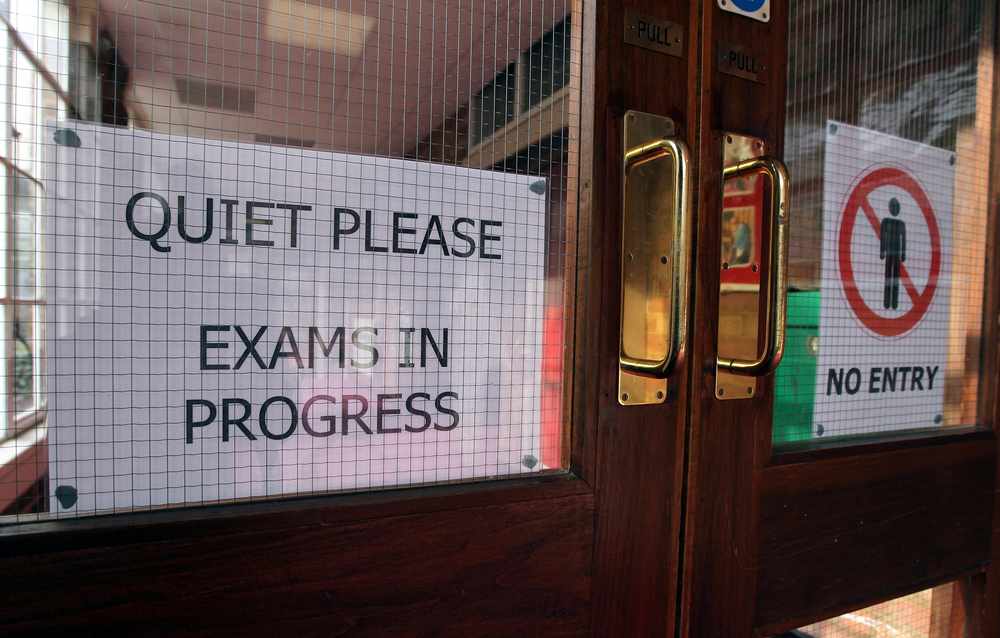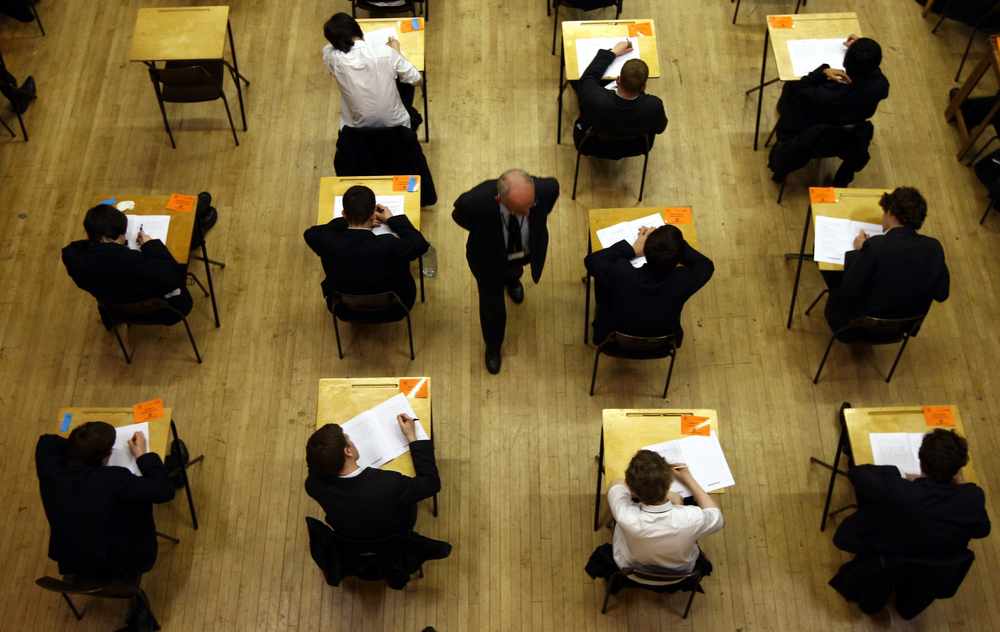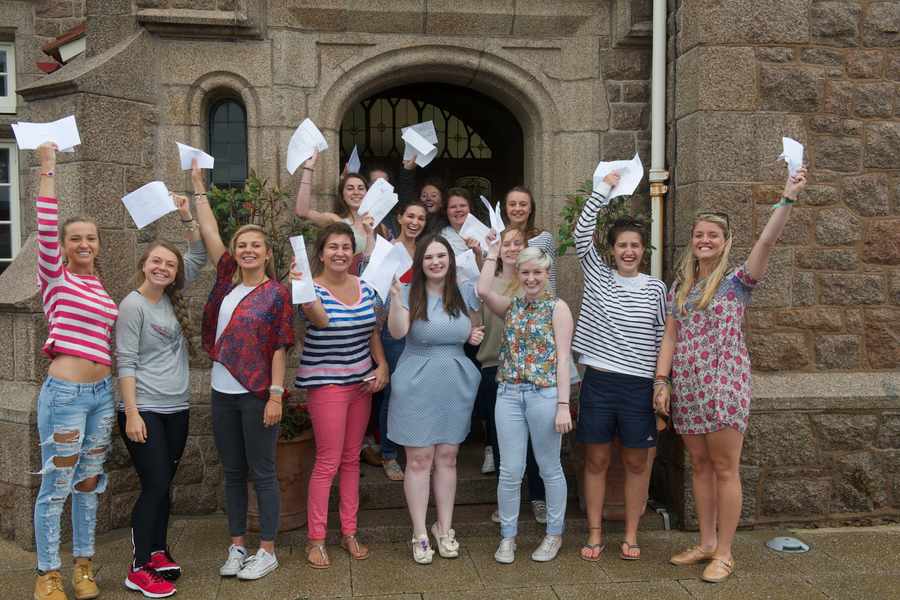For the first time in-depth analysis of all Island GCSE or equivalent qualifications has been carried out and made public, with like-for-like comparisons made from the previous year and with average results in England.
And according to the report, which was compiled by the Education Department, not only did Island teenagers achieve higher grades than in 2013, but they also outperformed their English counterparts – albeit by a small margin.
Overall, last year 58.7 per cent of Jersey pupils achieved the benchmark of five or more A* to C grades including English and maths, in comparison to 53.1 per cent in the previous year.
The 2014 results were 1.9 per cent higher than in England, which had a national average of 56.8 per cent.

However, according to the report, Jersey students did not perform as well on their first exam attempts – with slightly under half (49.8%) gaining five A* to C grades including English and maths the first time around, compared to 53.4 per cent across the Channel.
This comparison follows the introduction of a new method of setting performance indicators for school league tables in the UK – one which does not include re-sit grades, despite many results increasing on the second or third occasion.
Meanwhile, in Jersey girls did significantly better than boys – with 7.7 per cent more female pupils achieving at least five GCSEs at grades A* to C, including English and maths, than their male peers.
Among other notable findings, 15 per cent more students whose first language is English achieved at least five GCSEs at grades A* to C, including English and maths, than pupils with English as an additional language.
At a press briefing on Thursday, director of Education Justin Donovan said that ‘significant progress’ had been made in 2014.


‘The bottom line is that last summer’s kids did better than the year’s before – quite a lot better – which is great news,’ he said.
‘We made significant progress last summer – it’s fantastic news for the kids, staff and parents, but we still need to do a lot better at GCSEs than we are currently doing.’
Mr Donovan added that the new UK performance indicators had caused difficulties making comparisons with the Island.
‘We have to compare ourselves to the UK because we do 97 per cent of our business with the UK, we take UK qualifications, our kids on the whole go to UK universities, so comparing ourselves with anywhere else is a bit silly.
‘We in Jersey don’t have to conform to the changes being made in the UK, but it does leave us with difficulty in terms of comparison.’
However, the Education Director said that the report ‘poses questions rather than answers them’.
‘This report will give us hours of debate in the department. This gives us is information we haven’t had before – really detailed information about how our young people are doing that means we can change how we teach and the way we teach.
‘We want every single indicator to be above the UK – better attendances, better GCSEs, better in every single one.’

EDUCATION is making a concerted effort to raise GCSE results in Jersey above those in the UK, according to the Education Minister.
Deputy Rod Bryans told Members in the States Chamber last month that Island results had been consistently higher than the UK for over a decade up until 2011, when the number of students in the UK gaining five GCSEs at grades A* to C, including maths and English, reached 59 per cent – ahead of Jersey’s 58 per cent for the first time.
Answering a question from Deputy Montfort Tadier, Deputy Bryans said that several main areas were being targeted for improvement, including standards, curriculum and school autonomy, which would allow individual institutions to make their own decisions on certain matters.

Jersey’s A-level averages
- The average points per A-level entry was 224.3, a C+ grade.
- Across the board the average score was higher for girls (228.1, a B- grade) than it was for boys (220.3, a C+ grade).
- 18.9% of girls achieved grades AAB or better compared to 15.8% of boys.
- But more boys (9.9%) achieved three or more A* or A grades in all their exams, with 8.6% of girls achieving the same standard.
- Nearly 25% of all A-level entries resulted in an A* or A grade, with 80% of all students achieving A* to C marks.
Jersey v England
- Overall, there was a higher level of participation in Level Three qualifications in England than in Jersey.
- Locally, 56.1% of students continued their studies after GCSEs, compared to 64.5% in England.
- Participation rates in A-levels and the Baccalaureate programme between the two jurisdictions vary only slightly. The results show that a greater percentage of girls moved on to pursue Level Three qualifications compared to boys in both Jersey and England.
- The Island compared favourably when it came to the average point scores received by students last year. Jersey students scored marginally higher, but both jurisdictions fell within the C+ A-level banding on average.
- Girls again scored higher on average than their male counterparts.
- However, when it came to the higher academic achievers within the A-level cohort, England produced a greater percentage of students receiving three or more A* or A grades.
- Twelve per cent of pupils in England hit that mark compared to 9% of students in Jersey, with boys beating girls in both places.
- Similarly, a greater percentage of pupils received A-level grades of AAB or better in England, with nearly 20% achieving these marks compared to 17.4% in the Island.
- Overall, however, Jersey had a slightly higher A-level pass rate of 99.2% (grades A* to E) compared to Englands 98.6%, with girls performing better in both locations.[/breakout]
STATISTICS can tell any number of stories. Today, it seems, they say that our secondary schools are in relatively good health. Not only have GCSE results improved in the Island, but Jersey students are, according to one measure at least, performing better than their UK peers.
It is particularly reassuring to see that English grades have improved.
Last year, the UK introduced a new performance regime, which means that if pupils retake an exam, the second result does not count towards the official statistics. Alternative exams, such as the IGCSE, have also been discounted.
There was concern across the Channel that schools were trying to manipulate the system to bump their schools up the league tables. That may be true, but it is only a part of the story.
Enabling students to retake or giving them the flexibility to take alternative exams is also about tailoring education to the specific needs of different students.
Jersey has the freedom to pick and choose the best parts of the best examples of education from around the world. One thing we must not do is become a slave to league tables and if that means turning our back on the UK model, we should.
Care should also be taken not to read too much into UK comparisons. The performance of a few children can have a disproportionate influence on overall statistics. In Jersey, there are around 1,000 GCSE candidates each year. In the UK, the figure is around 650,000.
The data released today raises as many questions as it answers. We now need to know the hows, whys and what happens next.
Education director Justin Donovan, who wants Jersey to do better than the UK in all major performance criteria within three years, has committed to drilling down into the figures to find out how we can do even better.
It is reassuring to know that better does not always mean being at the top of league tables. Our schools must produce students who have reached their potential wherever their talents lie.
But when Mr Donovan does find the answers to some of the underlying questions about the future of education in Jersey, he and his team must be allowed to create a system fit for today and tomorrow. In the meantime, we can be reassured that there is nothing to panic about. Jersey schools are doing a good job, but understand the need for improvement.







